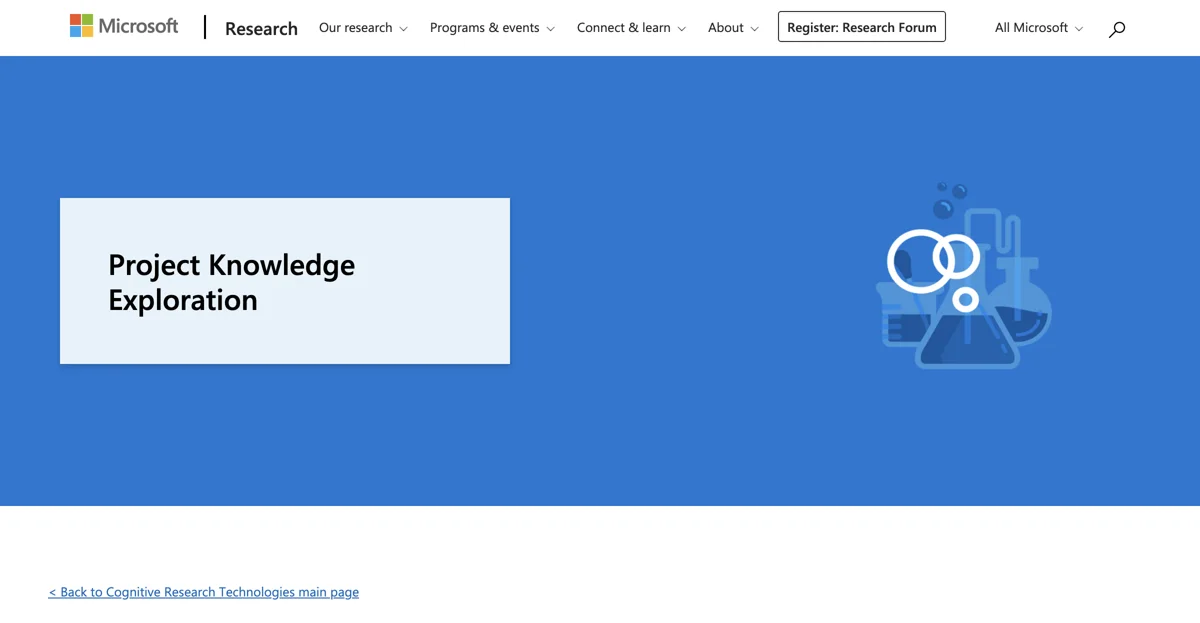Project Knowledge Exploration by Microsoft Research is a cutting-edge platform that utilizes artificial intelligence to provide users with a comprehensive and immersive research experience. It incorporates various features such as natural language understanding to interpret queries as structured expressions, query auto-completion to minimize user effort, and structured query evaluation for efficient information retrieval. Additionally, it enables rich visualizations and interactive faceted experiences through attribute histograms. This tool is designed to assist researchers, developers, and professionals in various fields by facilitating the exploration and discovery of knowledge. It adheres to strict privacy and security standards, ensuring the protection of user data. Overall, Project Knowledge Exploration is a valuable asset for those seeking to advance their knowledge and research capabilities.

Project Knowledge Exploration
Discover the power of Project Knowledge Exploration by Microsoft Research for in-depth knowledge exploration and discovery.

Top Alternatives to Project Knowledge Exploration
SRI
SRI is an AI-powered R&D institute with diverse offerings
Atomic AI
Atomic AI is an AI-powered RNA drug discovery platform
Immunai
Immunai supports drug discovery with AI-powered solutions
EvoLogics
EvoLogics offers underwater communication and positioning solutions
Bethge Lab
Bethge Lab is an AI research group with diverse focuses
Receptive AI
Receptive AI enhances workplace inclusivity and psychological safety, boosting employee retention.
Galactica Demo
Galactica Demo is an AI-powered research tool designed for the scientific community to explore and reproduce AI research findings.
Quilter
Quilter is an AI-powered PCB designer that automates circuit board layout, optimizing designs for performance and manufacturing.
Labelbox
Labelbox is an AI-powered data labeling platform that helps users build better AI products remarkably fast.
Taalas
Taalas is an AI-powered platform that transforms AI models into custom silicon for 1000x efficiency.
Nextml
Nextml specializes in custom machine learning projects, enhancing satellite image analysis, railroad infrastructure damage detection, and text recognition in industrial settings.
Data Science & AI Workbench
Data Science & AI Workbench is a comprehensive platform that accelerates AI project development and deployment with robust security and governance.
Lambda | GPU Compute for AI
Lambda provides on-demand NVIDIA GPU instances and clusters for AI training and inference, designed for developers.
Granica AI
Granica AI enhances AI projects by optimizing data management for compactness, safety, and efficiency.
Azure Machine Learning
Azure Machine Learning is an enterprise-grade AI service that supports the end-to-end machine learning lifecycle, enabling businesses to build, deploy, and manage ML models at scale.
FlyPix
FlyPix is an AI-powered geospatial platform that helps users detect and analyze objects on Earth’s surface with precision.
Human or AI Game
Human or AI Game is an interactive platform that challenges users to distinguish between human and AI-generated images, contributing to academic research.
KBY
KBY-AI offers advanced SDKs for identity verification, including face recognition, liveness detection, and palm recognition, enhancing security and user experience.
VortiX
VortiX is an AI-powered search engine that helps users find precise scientific research papers with clear explanations.
Rayyan
Rayyan is an AI-powered platform that accelerates systematic and literature reviews, saving researchers significant time.
BioRaptor
BioRaptor is an AI-powered platform that helps scientists extract actionable insights from bioprocess data to enhance product development.